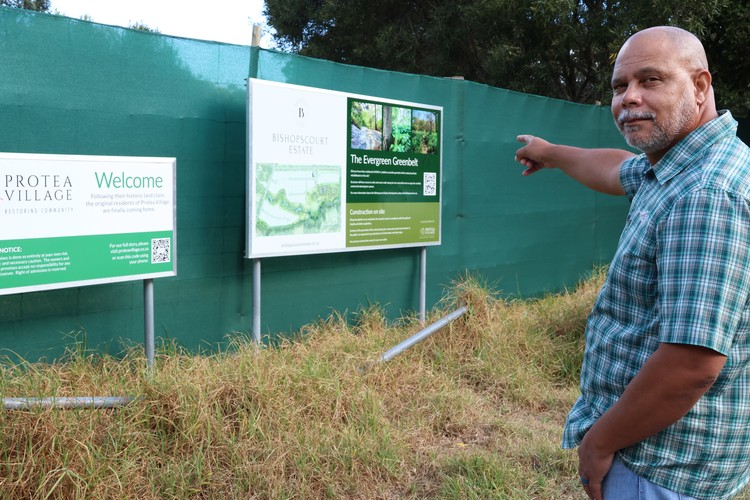Bishopscourt land claimants to finally break ground on housing development
This comes 20 years after their claim was officially granted
Andre Maxwell, chair of the Protea Village Communal Property Association, is one of 86 families, forcefully evicted during apartheid, hoping to move back to Bishopscourt. Photo: Matthew Hirsch.
- Families forcefully removed during apartheid from land in Cape Town’s upmarket Bishopscourt will finally be breaking ground for their new housing development later this year.
- The Protea Village community’s land claim was granted in 2006.
- At least 46 families from the original claim opted for compensation, but 86 families are expected to build homes and move back to Bishopscourt.
- The development has suffered extensive delays, including two separate court cases and an appeal against the development plans.
Nearly 20 years after families evicted during apartheid had a successful land claim, they will finally start building their homes in Bishopscourt later this year. The site is currently being cleared.
Andre Maxwell, chairperson of the Protea Village Communal Property Association, was born in Lotus River, the only one of his six siblings who did not live in Bishopscourt. Maxwell says that despite the many hurdles they’ve faced to get to this point, the 86 families are hopeful to return soon. The family shares fond memories of the once closely-knit Protea Village community.
“That sense of community was taken away when people were dispersed across the Cape Flats,” says Maxwell.
The housing development follows a successful land claim in 2006. At least 46 families, who were part of the original claim lodged in 1995, opted for compensation.
Two years ago, GroundUp reported that the state and the City of Cape Town had agreed to award two erfs to the community as part of the land claim settlement.
The restitution project uses a unique cross-subsidisation business plan. The community agreed to sell private residential stands on one side of Kirstenbosch Drive to fund the construction of homes for returning claimants to be built on the other side of the site.
The development has suffered several extensive delays. An appeal against the development plans lodged in November 2022 was later withdrawn. A court case brought by a resident has been settled.
Maxwell says he is excited to return to the community where his family once lived. But this is a bittersweet victory because his mother, who was the original claimant, has since died.
“Things could have gone a hundred different ways, but I’m happy with the way our land claim went. Notwithstanding the duration and all the challenges that we faced, it showed more of our character, both as a community and from a development point of view as well,” he says.
One point of concern by the Bishopscourt community was the removal of a large tree from the site.
Dave Child, of Bethel Partners, the development manager for the project, told GroundUp that there had been an extensive tree survey as part of the project. There was also a plan to plant indigenous trees. He said the plan had been developed over two years.
In a joint response to GroundUp’s questions, the chairs of Bishopscourt Residents Association and Fernwood Residents Association, said they were working with the returning families and current residents.
“We are happy to see the development finally underway. It’s been a long, consultative process of almost three decades with many setbacks, but it is good news to see substantive progress,” they said.
They said they are working on a “fact sheet” on the development that would be sent to residents.
“We believe that most residents understand and support the process. But there have been concerns about the environmental impact of the development, and we have engaged with the developers in this regard. Some, but not all of the public areas, have been closed for rehabilitation work,” they said.
Support independent journalism
Donate using Payfast

Don't miss out on the latest news
We respect your privacy, and promise we won't spam you.
Letters
Dear Editor
This article gives some hope that land claimants will eventually be compensated. My husband's family has been waiting for over two decades just for the land to be transferred to them. They are part of the Marra and Smith families. Their family owned a shop and had housing on the beachfront (where the restaurant's in Langebaan are now). Marra Square and Marra Street still exist in Langebaan today. They were forcibly removed as the beachfront was designated a "white only" area. They have been allocated land, but it has yet to even be transferred. No idea why it keeps stalling or who might be stalling it.
© 2025 GroundUp. This article is licensed under a Creative Commons Attribution-NoDerivatives 4.0 International License.
You may republish this article, so long as you credit the authors and GroundUp, and do not change the text. Please include a link back to the original article.
We put an invisible pixel in the article so that we can count traffic to republishers. All analytics tools are solely on our servers. We do not give our logs to any third party. Logs are deleted after two weeks. We do not use any IP address identifying information except to count regional traffic. We are solely interested in counting hits, not tracking users. If you republish, please do not delete the invisible pixel.

